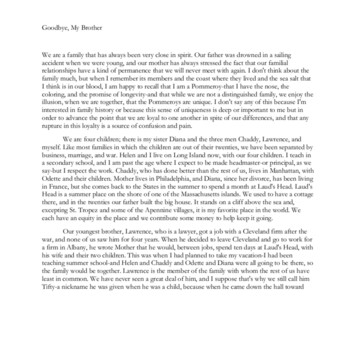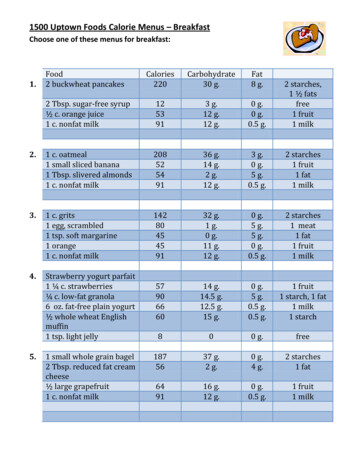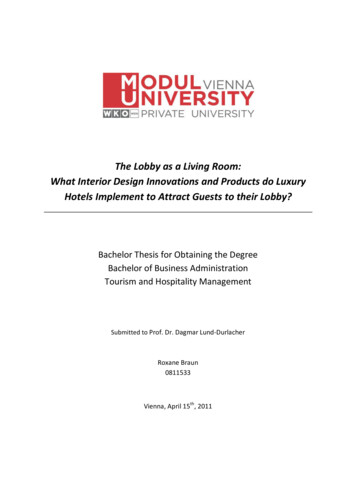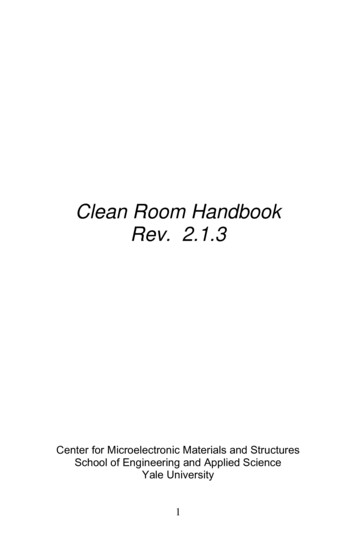
Transcription
the dining room for breakfast, his slippers made a noise that sounded like "Tifty, tifty, tifty." That'swhat Father called him, and so did everyone else. When he grew older, Diana sometimes used to callhim Little Jesus, and Mother often called him the Croaker. We had disliked Lawrence, but we lookedforward to his return with a mixture of apprehension and loyalty, and with some of the joy anddelight of reclaiming a brother.Lawrence crossed over from the mainland on the four-o'clock boat one afternoon late in thesummer, and Chaddy and I went down to meet him. The arrivals and departures of the summerferry have all the outward signs that suggest a voyage-whistles, bells, hand trucks, reunions, and thesmell of brine-but it is a voyage of no import, and when I watched the boat come into the blueharbor that afternoon and thought that it was completing a voyage of no import, I realized that Ihad hit on exactly the kind of observation that Lawrence would have made. We looked for his facebehind the windshields as the cars drove off the boat, and we had no trouble in recognizing him.And we ran over and shook his hand and clumsily kissed his wife and the children. "Tifty!" Chaddyshouted. "Tifty!" It is difficult to judge changes in the appearance of a brother, but both Chaddy andI agreed, as we drove back to Laud's Head, that Lawrence still looked very young. He got to thehouse first, and we took the suitcases out of his car. When I came in, he was standing in the livingroom, talking with Mother and Diana. They were in their best clothes and all their jewelry, and theywere welcoming him extravagantly, but even then, when everyone was endeavoring to seem mostaffectionate and at a time when these endeavors come easiest, I was aware of a faint tension in theroom. Thinking about this as I carried Lawrence's heavy suitcases up the stairs, I realized that ourdislikes are as deeply ingrained as our better passions, and I remembered that once, twenty-five yearsago, when I had hit Lawrence on the head with a rock, he had picked himself up and gone directlyto our father to complain.I carried the suitcases up to the third floor, where Ruth, Lawrence's wife, had begun to settleher family. She is a thin girl, and she seemed very tired from the journey, but when I asked her if shedidn't want me to bring a drink upstairs to her, she said she didn't think she did.When I got downstairs, Lawrence wasn't around, but the others were all ready for cocktails,and we decided to go ahead. Lawrence is the only member of the family who has never enjoyeddrinking. We took our cocktails onto the terrace, so that we could see the bluffs and the sea and theislands in the east, and the return of Lawrence and his wife, their presence in the house, seemed torefresh our responses to the familiar view; it was as if the pleasure they would take in the sweep andthe color of that coast, after such a long absence, had been imparted to us. While we were there,Lawrence came up the path from the beach."Isn't the beach fabulous, Tifty?" Mother asked. "Isn't it fabulous to be back? Will you havea Martini?""I don't care," Lawrence said. "Whiskey, gin-I don't care what I drink. Give me a little rum.""We don't have any rum," Mother said. It was the first note of asperity. She had taught usnever to be indecisive, never to reply as Lawrence had. Beyond this, she is deeply concerned withthe propriety of her house, and anything irregular by her standards, like drinking straight rum orbringing a beer can to the dinner table, excites in her a conflict that she cannot, even with hercapacious sense of humor, surmount. She sensed the asperity and worked to repair it. "Would youlike some Irish, Tifty dear?" she said. "Isn't Irish what you've always liked? There's some Irish on thesideboard. Why don't you get yourself some Irish?"
Lawrence said that he didn't care. He poured himself a Martini, and then Ruth came downand we went in to dinner.In spite of the fact that we had, through waiting for Lawrence, drunk too much beforedinner, we were all anxious to put our best foot forward and to enjoy a peaceful time. Mother is asmall woman whose face is still a striking reminder of how pretty she must have been, and whoseconversation is unusually light, but she talked that evening about a soil-reclamation project that isgoing on up-island. Diana is as pretty as Mother must have been; she is an animated and lovelywoman who likes to talk about the dissolute friends that she has made in France, but she talked thatnight about the school in Switzerland where she had left her two children. I could see that thedinner had been planned to please Lawrence. It was not too rich, and there was nothing to makehim worry about extravagance.After supper, when we went back onto the terrace, the clouds held that kind of light thatlooks like blood, and I was glad that Lawrence had such a lurid sunset for his homecoming. Whenwe had been out there a few minutes, a man named Edward Chester came to get Diana. She hadmet him in France, or on the boat home, and he was staying for ten days at the inn in the village. Hewas introduced to Lawrence and Ruth, and then he and Diana left."Is that the one she's sleeping with now?" Lawrence asked."What a horrid thing to say!" Helen said."You ought to apologize for that, Tifty," Chaddy said."I don't know," Mother said tiredly. "I don't know, Tifty. Diana is in a position to dowhatever she wants, and I don't ask sordid questions. She's my only daughter. I don't see her often.""Is she going back to France?""She's going back the week after next."Lawrence and Ruth were sitting at the edge of the terrace, not in the chairs, not in the circleof chairs. With his mouth set, my brother looked to me then like a Puritan cleric. Sometimes, when Itry to understand his frame of mind, I think of the beginnings of our family in this country, and hisdisapproval of Diana and her lover reminded me of this. The branch of the Pommeroys to which webelong was founded by a minister who was eulogized by Cotton Mather for his untiring abjurationof the Devil. The Pommeroys were ministers until the middle of the nineteenth century, and theharshness of their thought-man is full of misery, and all earthly beauty is lustful and corrupt-hasbeen preserved in books and sermons. The temper of our family changed somewhat and becamemore lighthearted, but when I was of school age, I can remember a cousinage of old men andwomen who seemed to hark back to the dark days of the ministry and to be animated by perpetualguilt and the deification of the scourge. If you are raised in this atmosphere-and in a sense we were-Ithink it is a trial of the spirit to reject its habits of guilt, self-denial, taciturnity, and penitence, and itseemed to me to have been a trial of the spirit in which Lawrence had succumbed."Is that Cassiopeia?" Odette asked."No, dear," Chaddy said. "That isn't Cassiopeia.""Who was Cassiopeia?" Odette said.
"She was the wife of Cepheus and the mother of Andromeda," I said."The cook is a Giants fan," Chaddy said. "She'll give you even money that they win thepennant."It had grown so dark that we could see the passage of light through the sky from thelighthouse at Cape Heron. In the dark below the cliff, the continual detonations of the surf sounded.And then, as she often does when it is getting dark and she has drunk too much before dinner,Mother began to talk about the improvements and additions that would someday be made on thehouse, the wings and bathrooms and gardens."This house will be in the sea in five years," Lawrence said."Tifty the Croaker," Chaddy said."Don't call me Tifty," Lawrence said."Little Jesus," Chaddy said."The sea wall is badly cracked," Lawrence said. "I looked at it this afternoon. You had itrepaired four years ago, and it cost eight thousand dollars. You can't do that every four years.""Please, Tifty," Mother said."Facts are facts," Lawrence said, "and it's a damned-fool idea to build a house at the edge ofthe cliff on a sinking coastline. In my lifetime, half the garden has washed away and there's four feetof water where we used to have a bathhouse.""Let's have a very general conversation," Mother said bitterly. "Let's talk about politics or theboat-club dance.""As a matter of fact," Lawrence said, "the house is probably in some danger now. If you hadan unusually high sea, a hurricane sea, the wall would crumble and the house would go. We could allbe drowned.""I can't bear it," Mother said. She went into the pantry and came back with a full glass of gin.I have grown too old now to think that I can judge the sentiments of others, but I wasconscious of the tension between Lawrence and Mother, and I knew some of the history of it.Lawrence couldn't have been more than sixteen years old when he decided that Mother wasfrivolous, mischievous, destructive, and overly strong. When he had determined this, he decided toseparate himself from her. He was at boarding school then, and I remember that he did not comehome for Christmas. He spent Christmas with a friend. He came home very seldom after he hadmade his unfavorable judgment on Mother, and when he did come home, he always tried, in hisconversation, to remind her of his estrangement. When he married Ruth, he did not tell Mother. Hedid not tell her when his children were born. But in spite of these principled and lengthy exertionshe seemed, unlike the rest of us, never to have enjoyed any separation, and when they are together,you feel at once a tension, an unclearness.And it was unfortunate, in a way, that Mother should have picked that night to get drunk.It's her privilege, and she doesn't get drunk often, and fortunately she wasn't bellicose, but we were
all conscious of what was happening. As she quietly drank her gin, she seemed sadly to be partingfrom us; she seemed to be in the throes of travel.Then her mood changed from travel to injury, and the few remarks she made were petulantand irrelevant. When her glass was nearly empty, she stared angrily at the dark air in front of hernose, moving her head a little, like a fighter. I knew that there was not room in her mind then for allthe injuries that were crowding into it. Her children were stupid, her husband was drowned, herservants were thieves, and the chair she sat in was uncomfortable. Suddenly she put down her emptyglass and interrupted Chaddy, who was talking about baseball. "I know one thing," she said hoarsely."I know that if there is an afterlife, I'm going to have a very different kind of family. I'm going tohave nothing but fabulously rich, witty, and enchanting children." She got up and, starting for thedoor, nearly fell. Chaddy caught her and helped her up the stairs. I could hear their tender goodnights, and then Chaddy came back. I thought that Lawrence by now would be tired from hisjourney and his return, but he remained on the terrace, as if he were waiting to see the finalmalfeasance, and the rest of us left him there and went swimming in the dark.When I woke the next morning, or half woke, I could hear the sound of someone rolling thetennis court. It is a fainter and a deeper sound than the iron buoy bells off the point-an unrhythmiciron chiming-that belongs in my mind to the beginnings of a summer day, a good portent. When Iwent downstairs, Lawrence's two kids were in the living room, dressed in ornate cowboy suits. Theyare frightened and skinny children. They told me their father was rolling the tennis court but thatthey did not want to go out because they had seen a snake under the doorstep. I explained to themthat their cousins-all the other children-ate breakfast in the kitchen and that they'd better run alongin there. At this announcement, the boy began to cry. Then his sister joined him. They cried as if togo in the kitchen and eat would destroy their most precious rights. I told them to sit down with me.Lawrence came in, and I asked him if he wanted to play some tennis. He said no, thanks, althoughhe thought he might play some singles with Chaddy. He was in the right here, because both he andChaddy play better tennis than I, and he did play some singles with Chaddy after breakfast, but lateron, when the others came down to play family doubles, Lawrence disappeared. This made me crossunreasonably so, I suppose-but we play darned interesting family doubles and he could have playedin a set for the sake of courtesy.Late in the morning, when I came up from the court alone, I saw Tifty on the terrace, pryingup a shingle from the wall with his jackknife. "What's the matter, Lawrence?" I said. "Termites?"There are termites in the wood and they've given us a lot of trouble.He pointed out to me, at the base of each row of shingles, a faint blue line of carpenter'schalk. "This house is about twenty-two years old," he said. "These shingles are about two hundredyears old. Dad must have bought shingles from all the farms around here when he built the place, tomake it look venerable. You can still see the carpenter's chalk put down where these antiques werenailed into place."It was true about the shingles, although I had forgotten it. When the house was built, ourfather, or his architect, had ordered it covered with lichened and weather-beaten shingles. I didn'tfollow Lawrence's reasons for thinking that this was scandalous."And look at these doors," Lawrence said. "Look at these doors and window frames." Ifollowed him over to a big Dutch door that opens onto the terrace and looked at it. It was arelatively new door, but someone had worked hard to conceal its newness. The surface had been
deeply scored with some metal implement, and white paint had been rubbed into the incisions toimitate brine, lichen, and weather rot. "Imagine spending thousands of dollars to make a soundhouse look like a wreck," Lawrence said. "Imagine the frame of mind this implies. Imagine wantingto live so much in the past that you'll pay men carpenters' wages to disfigure your front door." ThenI remembered Lawrence's sensitivity to time and his sentiments and opinions about our feelings forthe past. I had heard him say, years ago, that we and our friends and our part of the nation, findingourselves unable to cope with the problems of the present, had, like a wretched adult, turned back towhat we supposed was a happier and a simpler time, and that our taste for reconstruction andcandlelight was a measure of this irremediable failure. The faint blue line of chalk had reminded himof these ideas, the scarified door had reinforced them, and now clue after clue presented itself tohim-the stern light at the door, the bulk of the chimney, the width of the floorboards and the piecesset into them to resemble pegs. While Lawrence was lecturing me on these frailties, the others cameup from the court. As soon as Mother saw Lawrence, she responded, and I saw that there was littlehope of any rapport between the matriarch and the changeling. She took Chaddy's arm. "Let's goswimming and have Martinis on the beach," she said. "Let's have a fabulous morning."The sea that morning was a solid color, like verd stone. Everyone went to the beach butTifty and Ruth. "I don't mind him ," Mother said. She was excited, and she tipped her glass andspilled some gin into the sand. "I don't mind him . It doesn't matter to me how rude andhorrid and gloomy he is, but what I can't bear are the faces of his wretched little children, thosefabulously unhappy little children." With the height of the cliff between us, everyone talkedwrathfully about Lawrence; about how he had grown worse instead of better, how unlike the rest ofus he was, how he endeavored to spoil every pleasure. We drank our gin; the abuse seemed to reacha crescendo, and then, one by one, we went swimming in the solid green water. But when we cameout no one mentioned Lawrence unkindly; the line of abusive conversation had been cut, as ifswimming had the cleansing force claimed for baptism. We dried our hands and lighted cigarettes,and if Lawrence was mentioned, it was only to suggest, kindly, something that might please him.Wouldn't he like to sail to Barin's cove, or go fishing?And now I remember that while Lawrence was visiting us, we went swimming oftener thanwe usually do, and I think there was a reason for this. When the irritability that accumulated as aresult of his company began to lessen our patience, not only with Lawrence but with one another,we would all go swimming and shed our animus in the cold water. I can see the family now,smarting from Lawrence's rebukes as they sat on the sand, and I can see them wading and divingand surface-diving and hear in their voices the restoration of patience and the rediscovery ofinexhaustible good will. If Lawrence noticed this change-this illusion of purification-I suppose thathe would have found in the vocabulary of psychiatry, or the mythology of the Atlantic, somecircumspect name for it, but I don't think he noticed the change. He neglected to name the curativepowers of the open sea, but it was one of the few chances for diminution that he missed.The cook we had that year was a Polish woman named Anna Ostrovick, a summer cook.She was first-rate-a big, fat, hearty, industrious woman who took her work seriously. She liked tocook and to have the food she cooked appreciated and eaten, and whenever we saw her, she alwaysurged us to eat. She cooked hot bread-crescents and brioches for breakfast two or three times aweek, and she would bring these into the dining room herself and say, "Eat, eat, eat!" When themaid took the serving dishes back into the pantry, we could sometimes hear Anna, who wasstanding there, say, "Good! They eat." She fed the garbage man, the milkman, and the gardener."Eat!" she told them. "Eat, eat!" On Thursday afternoons, she went to the movies with the maid, but
she didn't enjoy the movies, because the actors were all so thin. She would sit in the dark theatre foran hour and a half watching the screen anxiously for the appearance of someone who had enjoyedhis food. Bette Davis merely left with Anna the impression of a woman who has not eaten well."They are all so skinny," she would say when she left the movies. In the evenings, after she hadgorged all of us, and washed the pots and pans, she would collect the table scraps and go out to feedthe creation. We had a few chickens that year, and although they would have roosted by then, shewould dump food into their troughs and urge the sleeping fowl to eat. She fed the songbirds in theorchard and the chipmunks in the yard. Her appearance at the edge of the garden and her urgentvoice-we could hear her calling "Eat, eat, eat"-had become, like the sunset gun at the boat club andthe passage of light from Cape Heron, attached to that hour. "Eat, eat, eat," we could hear Anna say."Eat, eat." Then it would be dark.When Lawrence had been there three days, Anna called me into the kitchen. "You tell yourmother," she said, "that he doesn't come into my kitchen. If he comes into my kitchen all the time, Igo. He is always coming into my kitchen to tell me what a sad woman I am. He is always telling methat I work too hard and that I don't get paid enough and that I should belong to a union withvacations. Ha! He is so skinny but he is always coming into my kitchen when I am busy to pity me,but I am as good as him, I am as good as anybody, and I do not have to have people like that gettinginto my way all the time and feeling sorry for me. I am a famous and a wonderful cook and I havejobs everywhere and the only reason I come here to work this summer is because I was never beforeon an island, but I can have other jobs tomorrow, and if he is always coming into my kitchen to pityme, you tell your mother I am going. I am as good as anybody and I do not have to have that skinnyall the time telling how poor I am."I was pleased to find that the cook was on our side, but I felt that the situation was delicate.If Mother asked Lawrence to stay out of the kitchen, he would make a grievance out of the request.He could make a grievance out of anything, and it sometimes seemed that as he sat darkly at thedinner table, every word of disparagement, wherever it was aimed, came home to him. I didn'tmention the cook's complaint to anyone, but somehow there wasn't any more trouble from thatquarter.The next cause for contention that I had from Lawrence came over our backgammongames.When we are at Laud's Head, we play a lot of backgammon. At eight o'clock, after we havedrunk our coffee, we usually get out the board. In a way, it is one of our pleasantest hours. Thelamps in the room are still unlighted, Anna can be seen in the dark garden, and in the sky above herhead there are continents of shadow and fire. Mother turns on the light and rattles the dice as asignal. We usually play three games apiece, each with the others. We play for money, and you canwin or lose a hundred dollars on a game, but the stakes are usually much lower. I think thatLawrence used to play-I can't remember-but he doesn't play any more. He doesn't gamble. This isnot because he is poor or because he has any principles about gambling but because he thinks thegame is foolish and a waste of time. He was ready enough, however, to waste his time watching therest of us play. Night after night, when the game began, he pulled a chair up beside the board, andwatched the checkers and the dice. His expression was scornful, and yet he watched carefully. Iwondered why he watched us night after night, and, through watching his face, I think that I mayhave found out.
Lawrence doesn't gamble, so he can't understand the excitement of winning and losingmoney. He has forgotten how to play the game, I think, so that its complex odds can't interest him.His observations were bound to include the facts that backgammon is an idle game and a game ofchance, and that the board, marked with points, was a symbol of our worthlessness. And since hedoesn't understand gambling or the odds of the game, I thought that what interested him must bethe members of his family. One night when I was playing with Odette-I had won thirty-seven dollarsfrom Mother and Chaddy-I think I saw what was going on in his mind.Odette has black hair and black eyes. She is careful never to expose her white skin to the sunfor long, so the striking contrast of blackness and pallor is not changed in the summer. She needsand deserves admiration-it is the element that contents her-and she will flirt, unseriously, with anyman. Her shoulders were bare that night, her dress was cut to show the division of her breasts andto show her breasts when she leaned over the board to play. She kept losing and flirting and makingher losses seem like a part of the flirtation. Chaddy was in the other room. She lost three games, andwhen the third game ended, she fell back on the sofa and, looking at me squarely, said somethingabout going out on the dunes to settle the score. Lawrence heard her. I looked at Lawrence. Heseemed shocked and gratified at the same time, as if he had suspected all along that we were notplaying for anything so insubstantial as money. I may be wrong, of course, but I think that Lawrencefelt that in watching our backgammon he was observing the progress of a mordant tragedy in whichthe money we won and lost served as a symbol for more vital forfeits. It is like Lawrence to try toread significance and finality into every gesture that we make, and it is certain of Lawrence that whenhe finds the inner logic to our conduct, it will be sordid.Chaddy came in to play with me. Chaddy and I have never liked to lose to each other. Whenwe were younger, we used to be forbidden to play games together, because they always ended in afight. We think we know each other's mettle intimately. I think he is prudent; he thinks I am foolish.There is always bad blood when we play anything-tennis or backgammon or softball or bridge-and itdoes seem at times as if we were playing for the possession of each other's liberties. When I lose toChaddy, I can't sleep. All this is only half the truth of our competitive relationship, but it was thehalf-truth that would be discernible to Lawrence, and his presence at the table made me so selfconscious that I lost two games. I tried not to seem angry when I got up from the board. Lawrencewas watching me. I went out onto the terrace to suffer there in the dark the anger I always feel whenI lose to Chaddy.When I came back into the room, Chaddy and Mother were playing. Lawrence was stillwatching. By his lights, Odette had lost her virtue to me, I had lost my self-esteem to Chaddy, andnow I wondered what he saw in the present match. He watched raptly, as if the opaque checkers andthe marked board served for an exchange of critical power. How dramatic the board, in its ring oflight, and the quiet players and the crash of the sea outside must have seemed to him! Here wasspiritual cannibalism made visible; here, under his nose, were the symbols of the rapacious usehuman beings make of one another.Mother plays a shrewd, an ardent, and an interfering game. She always has her hands in heropponent's board. When she plays with Chaddy, who is her favorite, she plays intently. Lawrencewould have noticed this. Mother is a sentimental woman. Her heart is good and easily moved bytears and frailty, a characteristic that, like her handsome nose, has not been changed at all by age.Grief in another provokes her deeply, and she seems at times to be trying to divine in Chaddy somegrief, some loss, that she can succor and redress, and so re-establish the relationship that she enjoyedwith him when he was sickly and young. She loves defending the weak and the childlike, and now
that we are old, she misses it. The world of debts and business, men and war, hunting and fishinghas on her an exacerbating effect. (When Father drowned, she threw away his fly rods and his guns.)She has lectured us all endlessly on self-reliance, but when we come back to her for comfort and forhelp-particularly Chaddy-she seems to feel most like herself. I suppose Lawrence thought that theold woman and her son were playing for each other's soul.She lost. "Oh dear," she said. She looked stricken and bereaved, as she always does when sheloses. "Get me my glasses, get me my checkbook, get me something to drink." Lawrence got up atlast and stretched his legs. He looked at us all bleakly. The wind and the sea had risen, and I thoughtthat if he heard the waves, he must hear them only as a dark answer to all his dark questions; that hewould think that the tide had expunged the embers of our picnic fires. The company of a lie isunbearable, and he seemed like the embodiment of a lie. I couldn't explain to him the simple andintense pleasures of playing for money, and it seemed to me hideously wrong that he should have satat the edge of the board and concluded that we were playing for one another's soul. He walkedrestlessly around the room two or three times and then, as usual, gave us a parting shot. "I shouldthink you'd go crazy," he said, "cooped up with one another like this, night after night. Come on,Ruth. I'm going to bed."That night, I dreamed about Lawrence. I saw his plain face magnified into ugliness, andwhen I woke in the morning, I felt sick, as if I had suffered a great spiritual loss while I slept, like theloss of courage and heart. It was foolish to let myself be troubled by my brother. I needed avacation. I needed to relax. At school, we live in one of the dormitories, we eat at the house table,and we never get away. I not only teach English winter and summer but I work in the principal'soffice and fire the pistol at track meets. I needed to get away from this and from every other form ofanxiety, and I decided to avoid my brother. Early that day, I took Helen and the children sailing, andwe stayed out until suppertime. The next day, we went on a picnic. Then I had to go to New Yorkfor a day, and when I got back, there was the costume dance at the boat club. Lawrence wasn't goingto this, and it's a party where I always have a wonderful time.The invitations that year said to come as you wish you were. After several conversations,Helen and I had decided what to wear. The thing she most wanted to be again, she said, was a bride,and so she decided to wear her wedding dress. I thought this was a good choice-sincere,lighthearted, and inexpensive. Her choice influenced mine, and I decided to wear an old footballuniform. Mother decided to go as Jenny Lind, because there was an old Jenny Lind costume in theattic. The others decided to rent costumes, and when I went to New York, I got the clothes.Lawrence and Ruth didn't enter into any of this.Helen was on the dance committee, and she spent most of Friday decorating the club. Dianaand Chaddy and I went sailing. Most of the sailing that I do these days is in Manhasset, and I amused to setting a homeward course by the gasoline barge and the tin roofs of the boat shed, and itwas a pleasure that afternoon, as we returned, to keep the bow on a white church spire in the villageand to find even the inshore water green and clear. At the end of our sail, we stopped at the club toget Helen. The committee had been trying to give a submarine appearance to the ballroom, and thefact that they had nearly succeeded in accomplishing this illusion made Helen very happy. We droveback to Laud's Head. It had been a brilliant afternoon, but on the way home we could smell the eastwind-the dark wind, as Lawrence would have said-coming in from the sea.My wife, Helen, is thirty-eight, and her hair would be gray, I guess, if it were not dyed, but itis dyed an unobtrusive yellow-a faded color-and I think it becomes her. I mixed cocktails that night
while she was dressing, and when I took a glass upstairs to her, I saw her for the first time since ourmarriage in her wedding dress. There would be no point in saying that she looked to me morebeautiful
delight of reclaiming a brother. Lawrence crossed over from the mainland on the four-o'clock boat one afternoon late in the summer, and Chaddy and I went down to meet him. The arrivals and departures of the summer ferry have all the outward signs that suggest a v











